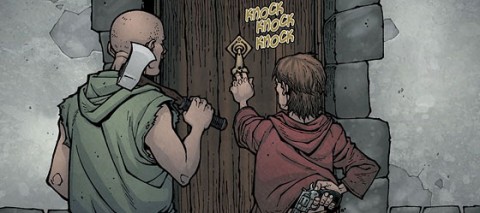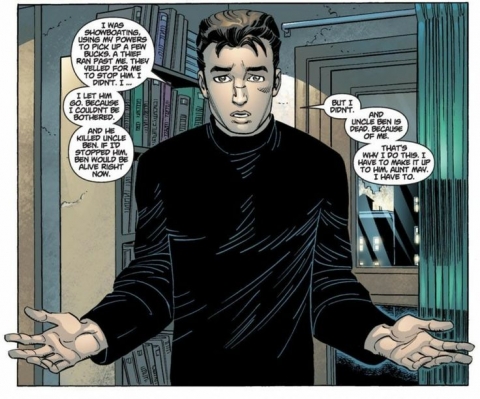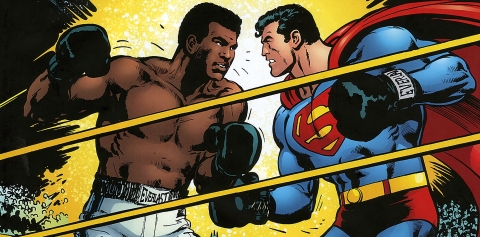52 weeks. 52 different writers. 2 trade paperbacks or hardcovers a week. Each week I’ll take a look at a different writer and read two different collected editions from within that person’s repertoire to help in the examination of their work. This week is all about Joe Hill’s work and his mastery at writing horrifying comics. I mean that in a “horrifying” scary way, not in a “horrifying” bad way…just so you know.
Joe Hill
To start off an article about Joe Hill without mentioning that he is the son of Stephen and Tabitha King just feels wrong for a few reasons. On one hand it is a great thing to acknowledge his familial roots and the fact that he is related to two great novelists. On the other hand it is a little insulting because Joe has gone by a different last name his entire career so that he could find success beyond just name recognition. Joe Hill has demonstrated his more than capable craft as he’s carved his way through the horror, thriller and adventure genres with his comics like Locke and Key, which is today’s book. Hill has an eerie style of writing that quickens your pulse and will leave you with a cold sweat as you flip through each page with thicken anticipation.
Locke And Key: Volume 1 – Welcome To Lovecraft
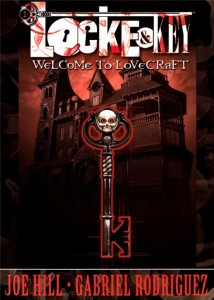 Following the sudden murder of their father, Tyler, Kinsey, and Bode relocate to the Keyhouse in Lovecraft, Massachusetts with their mother, Nina Locke. Moving into the home is a jarring experience for the whole family after having survived such a harrowing and deadly experience. Bode Locke, the youngest of the three children quickly discovers that there is far more than meets the eye when it comes to the Keyhouse, as it is deeply rooted in supernatural mysteries. Meanwhile, Sam Lesser, the killer of the Locke children’s father, is locked away in a juvenile detention center but still has a need for the Locke family and the secrets of the Keyhouse.
Following the sudden murder of their father, Tyler, Kinsey, and Bode relocate to the Keyhouse in Lovecraft, Massachusetts with their mother, Nina Locke. Moving into the home is a jarring experience for the whole family after having survived such a harrowing and deadly experience. Bode Locke, the youngest of the three children quickly discovers that there is far more than meets the eye when it comes to the Keyhouse, as it is deeply rooted in supernatural mysteries. Meanwhile, Sam Lesser, the killer of the Locke children’s father, is locked away in a juvenile detention center but still has a need for the Locke family and the secrets of the Keyhouse.
At first glance I imagined Locke and Key to be a murder mystery story but before the first issue is through you quickly come to the realization that it is far more than that. Locke and Key is definitely a supernatural thriller more so than anything, disguising itself as something else until the end of the first issue when you quickly have everything turned around on you. The great thing about a story with unexpected styles, twists and turns is that these surprises only hook you in to keep reading more. With the way this volume is written and laid out, you burn through the pages never really realizing how close you are to the conclusion as each cliffhanger or ending scene doesn’t necessarily need to be an exclamation mark at the end of an issue. All the covers of the issues are collected in the back of the book instead of separating each issue by having its cover denote its start. It is a fairly standard layout for graphic novels but one that only compliments Locke and Key in the best of ways as, in never giving you definitive stopping points between issues, you get addicted to the story and end up reading the entire book in one sitting.
You know you’re reading a good story when your expectations are completely subverted by the end of the first issue. The only true downfall I’d found in Locke and Key was the first twenty odd some pages, only to have my perspective changed by the final two pages of the first issue. For nearly the entire first issue, Locke and Key falls into far too many genre tropes that just don’t hook you in. You’re reading away, waiting for that plot beat to spin things around and grab you by the collar, as Joe Hill wisely waits to pull out a trick right as you’re ending the issue. You legitimately go “Huh?” when you see what it occurs, forcing you to trudge on into chapter two to find out what happens, only for chapter two to become chapter three and then three becomes four and so on. Before you know it the first volume is done and you need to know what happens next.
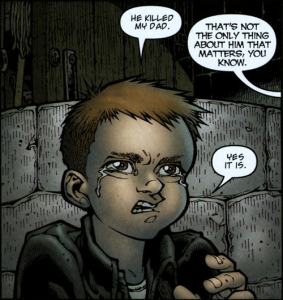
Although it is the supernatural elements of Locke and Key that keeps the wheels turning, the characters are absolutely the foundation of this story. The main characters never seem to catch a break as they’re constantly thrust from conflict to conflict within their new lives in the bat of an eye. You get a personal look at how all the Locke kids are handling the cold-blooded murder of their father, with each child coping in very different ways. Tyler, the eldest of the three, seems the most heartbroken over the whole ordeal and becomes a work horse. His father always rode him about working hard and doing well so it is great to see how the life lessons his father tried to bestow on him inform how Tyler progresses as an adult. Kinsey, the middle child, goes through a bit of an identity crisis in experiencing the loss of her father. She actually feels like the strongest of the three children, as the way she handles herself in the story suggests that she is making an attempt to move on past the tragedy she has experienced. As such, her scenes tend to have a sense of vigor that the other children’s scenes lack, being feisty and spunky but still emotional as well as emotive when it is required. Bode, the youngest child, has a delightful type of aloofness that keeps the character centered and actually keeps the story on the lighter side of things given the sometimes gloomy subject matter that is dealt with. His sense of curiosity and adventures is as dangerous as it is exciting, keeping you locked in and wide-eyed as you smile from ear to ear because of his silly nature.
The setting for Locke and Key, the Keyhouse, feels like a classic creepy horror house but with a great mysterious twist. Actually, it is probably more appropriate to say twists and really emphasize the plural nature of that word. By my count you discover at least four unique things about the house or objects in the house that effect the story and it is basically guaranteed that there are far more secrets hidden within Keyhouse. Joe Hill teases you with just enough intrigue surrounding the old home that you feel compelled to keep returning to it. You can’t look away in fear of missing something, regardless of how minute it appears. In blending the horror and mystery of the house together repeatedly throughout the story, Hill succeeds in hitting the right notes at the right time, giving it a true sense of synchronicity.
Collects: Locke and Key Issues 1-6.
Best Character: Bode Locke.
Best Line(s) of Dialogue/Caption: “I told Captain Stupid he better get used to cold showers.” – Bode Locke.
Best Moment: Bode’s discovery at the end of Issue 1.
Best Issue: Issue 5. It was a very tough decision to choose which issue truly stood out among such a solid collection. There was maybe one issue that felt it was a little lacking but the other five make up for it tenfold. I choose issue 5 because it is really where the volume starts to climax and you see the groundwork for some future stories being laid. Not to mention it is a truly tense read because of the terrible things that happen during it.
Why You Should Read It: It is always a great treat to read a comic book written by a novelist because it is as challenging an experience for them to write it as it may be for some people to read it. Novelists just structure their stories differently because of the difference in collaborative nature between comic books and novels. Joe Hill brings a solid style of structuring to Locke and Key that rewards readers with different pacing than your average comic. This series is full of some creepy moments but you can tell that there is a sense of adventure that’s yet to be explored by the time you finish this first volume. You’ll read the first volume and be hooked by all the questions you have left that need to be answered.
The Cape Volume 1
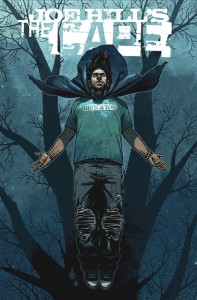 So I have to admit that I’m cheating a bit on my challenge here. Today is supposed to be a Joe Hill centric post when really it is about a graphic novel inspired by a short story by Joe Hill. It is claimed that today’s collection of stories, The Cape, is co-written by Joe Hill and Jason Ciaramella, with Ciaramella doing much of the heavy comic related lifting. So while this post isn’t truly just about Joe Hill, I think it actually ends up being all for the better because The Cape is an exquisite story that still deserves to have some attention shine down on it.
So I have to admit that I’m cheating a bit on my challenge here. Today is supposed to be a Joe Hill centric post when really it is about a graphic novel inspired by a short story by Joe Hill. It is claimed that today’s collection of stories, The Cape, is co-written by Joe Hill and Jason Ciaramella, with Ciaramella doing much of the heavy comic related lifting. So while this post isn’t truly just about Joe Hill, I think it actually ends up being all for the better because The Cape is an exquisite story that still deserves to have some attention shine down on it.
The Cape follows a young man named Eric who has had a generally crappy life. His father was killed in back in 1969 during combat, leaving a single mother to raise two young boys all by herself. Eric and his brother, Nick, cope with the death of their father rather easily because of their youthfulness, sharing a tight brotherly bond. The two brothers favourite pass time becomes pretending to be superheroes, with Eric donning a tattered, towel cape to compliment his superhero persona. One day, Eric climbs a tree while the two boys are playing and discovers that the cape actually grants him the powers to fly, only to fall from the tree and be gravely injured. Fast forward over a decade later, Eric has survived the incident only to become a recluse and social inept due to the injuries he had obtained. With his life in shambles, Eric suddenly finds the cape from his childhood and begins to wear it again, using his powers of flight to exact revenge on the people who he feels have ruined his life.
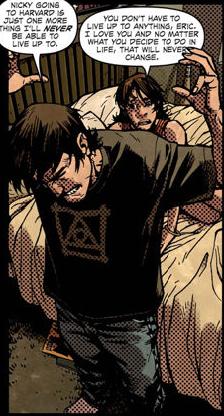
The Cape is definitely not a superhero book. Let’s just get that out of the way right away because it couldn’t be further from hero and closer to horror. To me, the basic premise of this graphic novel is the idea that “absolute power corrupts absolutely”. We see superheroes undergo villainous arcs all the time, traversing into morally grey areas only to triumphantly return from the fringe as a reformed hero. This isn’t the case with The Cape though as the marvel and luster of having superpowers isn’t a beautifully fun thing like it’s mainly portrayed in comics. The Cape showcases the corruption that these sort of powers can bring to someone who is irresponsible and for that reason alone The Cape is a brilliant read.
This book is definitely a character piece, honing in and examining the darkness that lives inside of a simple man like Eric. There aren’t any beautiful or fancy settings that enhance the character or the story itself because in this story character is key. That’s not to say that there aren’t subtle settings that do play huge parts in specific issues, like Eric’s mother’s basement or a certain zoo, but these settings are actually just plot devices themselves that are used to kick the story into the next gear. It is refreshing to read such a thick character driven story that doesn’t need to necessarily have distinct settings because it really does make this story all the more chilling. You see places or neighborhoods that resemble your average neighbourhood, making you feel like this could truly happen to anyone. It hammers home that feeling of randomness, which are always the most terrifying types of tragedies or crimes.
Joe Hill and Jason Ciaramella go to great lengths to make the character of Eric not only interesting but pathetic. As the story progresses and you see the shift in his character, you get a glimpse on how reliant he becomes on the powers he gains from the cape. As such, you watch pathetic shift to seemingly powerful, even if it is falsely so. The entire first chapter of this volume is used to build the character of Eric, showing us that after the accident he experiences as a child, he never properly recovers. He struggles to fit in and comes off as a slacker type, who just isn’t part of the social norm. You empathize with him because at the end of the day, it isn’t truly his fault that he is the way he is but at the same time you can’t help but feel like if he truly wanted to change and improve the quality of his life that he could. Even knowing that the story is going to go into a dark direction, nothing can truly prepare you for how that first chapter ends. You watch as Eric dons the cape for the first time since the accident and there is that momentary sense of awe, where you see on the page that this young man is experiencing a truly life changing moment. Fast forward a few pages ahead of that and you see the first instance where he actually abuses these powers and it hits you in a way that will send chills up your spine. You’ll want to stop reading but the writing is just so on point that to put the book down after seeing what you saw would be a travesty.
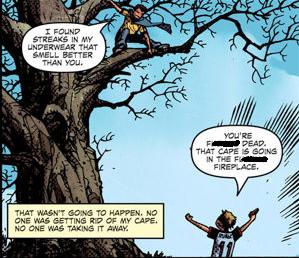
As the story progresses things only get more disturbing. Again, it needs to be said that this is a dark horror story. Not in a morbid sense but in a sense that some of the things that Eric does are just so evil that the character goes beyond any level of human redemption. With that said, his methods of dealing with his problems and the people who cause them do become repetitive after a certain point. As you can imagine, when your only superpower is flight, the best way to deal with problems is to let gravity aid you. Eric goes to this wheelhouse far too many times throughout the story to the point where you start to ask yourself if there are any really original ways to abuse this power beyond just letting gravity take the wheel. Rest assured there are, as Eric does deviate from his pattern at one point in the story to do what is easily one of the most disturbing things you’ll find in a comic.
With the dialogue here you get some good modern flare from Jason Ciaramella. Ciaramella’s dialogue might actually be the best part of the story when you really get down to looking at it. The way these characters talk just makes sense for how they’re portrayed. Eric has a really “screw it” attitude, while his brother Nick speaks with that wise, older brother type of maturity. Everywhere you turn in this story there are characters talking in believable ways that make you feel like you’re a part of the story. With such rich dialogue, it only adds to the sting of some of these shocking events that unfold, as how these characters are and react makes perfect sense in relation to what happens to them.

Collects: The Cape one-shot and The Cape #1-4.
Best Character: Eric.
Best Line of Dialogue/Caption: “Most nights, I fell asleep wrapped in the cape. It pained me to take it off and I felt undressed and vulnerable without it.” – Eric.
Best Scene/Moment: Eric uses a rope and a bear in a very unconventional manner to deal with a problem – Issue 1.
Best Issue: The Cape one-shot. You get your entire set-up for the story in the one-shot. It establishes your key players and hammers home Eric’s personality. There’s something about the way that the one-shot is written that makes you believe that when Eric regains the powers of the cape that he’ll do the right thing with them, only to have the rug pulled out from underneath you in a manner that will wrench your gut.
Why You Should Read It: The Cape is a chilling and visceral examination of how power can corrupt someone no matter who they are or what they stand for. When you place a unique power in someone’s hands, a power that no one else in the world has, they won’t become someone like Spider-Man all the time and this story shows that. Joe Hill and Joe Ciaramella turn a book that could’ve been a superhero story into one of the best horror mini-series I’ve ever read. You’ll be consistently surprised by how far Eric is willing to go to exact “revenge” against the people he believes have wronged him.

